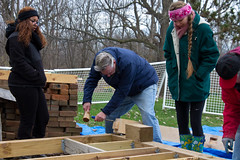Value of Manual Labor
I remember a month or so ago in class debating the merit of doing manual labor as opposed to typical classroom learning in a college setting. I definitely saw the value then of the manual work we’ve been doing at the cabin site, but I couldn’t really articulate why, or where that value was. That question has been on my mind ever since that class meeting and I’ve been trying to understand why I find the time we’ve spent working on the cabin from a manual labor standpoint to be so valuable.
I think one reason I see so much value in building the cabin while studying Thoreau is that it gives us a physical experience to supplement our readings and class discussions in studying and understanding Henry David Thoreau. What Thoreau did during those two years, two months, two weeks and two days is hard to comprehend by merely reading about it. By contributing to a replica of his cabin, we gain a deeper understanding of the blood, sweat, and tears that goes into building such a tiny space. Granted, there are differences; Thoreau was probably more knowledgable and talented in building than we were as a group, he worked alone on the cabin while we worked in a large group. However, by working on the cabin, we have a much better picture of Thoreau’s experience than if we merely read Walden and called it a day. For example, I never imagined how hard it could be to dig a hole three feet deep, but I got a much better idea after digging for only ten minutes. What Thoreau accomplished was much more than philosophical ideas. He put the work in, and a lot of it.
Outside the confines of this one class, however, I struggle to explain how manual labor can be valuable compared to restricting learning to standard study. I think a lot of it broadens the definition of “manual labor” to hands on learning. I’ve always been a firm believer that you’re going to learn more by doing than by reading or listening. I think students would learn and retain, as well as appreciate more information if they learned through hands on experiences, not necessarily digging a hole or mixing concrete, but hands on in the broader sense.



